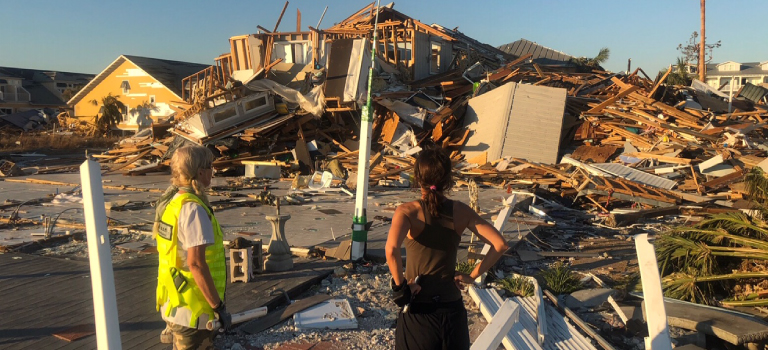Yale PA Online Faculty Member Volunteers as a First Responder for Hurricane Michael

Hurricane Michael, one of the most powerful storms in Florida history, made landfall near Panama City on October 10, 2018. It was a devastating storm, with 45 deaths attributed to it to date, and immense property damage and destruction. Knowing the storm would make landfall in the Florida panhandle, Yale Physician Assistant (PA) Online Program faculty member Mary Showstark, M.S., PA-C, drove over nine hours from her home in Miami, arriving at the impacted area on October 11 to help.
This was not the first time to a storm or other natural disaster, such as an earthquake. She has provided assistance both remotely and on the ground, working either with volunteer organizations or through the National Disaster Medical System (NDMS), which she has been part of since 2011.
Showstark, who experienced Hurricane Andrew when she was 12 years old, vividly remembers that storm, which had a formative impact on her. “I’ve always been sensitive to hurricanes,” she said. “The loss is unexplainable, the devastation leaves you speechless, but the resilience people have is what makes you feel alive. Watching people come together, neighbors helping neighbors, strangers becoming a team – there is nothing like it.” When asked about the challenges of being a first responder, Showstark said “I enjoy leaving my comfort zone.”
In the case of Hurricane Michael, Showstark could not deploy for the full two weeks that working through the NDMS required because of an obligation at a Physician Assistant Education Association conference. However, she was eager to provide assistance, so when she heard Florida governor Rick Scott publicly ask people to come and help, she responded. She joined a small team, operating under the auspices of Third Wave Volunteers, consisting of herself, another PA (Larry Applebee), a paramedic (Alison Thompson), and an army veteran (Mary Muniz). Thompson, who has been a full-time humanitarian volunteer since September 11, 2001, when she roller-bladed to Ground Zero to help as a first responder, now leads Third Wave Volunteers, a global volunteer organization that, among other roles, responds to areas affected by natural disasters.
Showstark and team were not sure what the water levels would be as they started off, but soon realized they would need a boat to be most effective. When Showstark did a Google search for airboats in Apalachicola, Florida, she hit upon Apalachicola Airboat Adventures. “Captain Larry”, who she serendipitously reached through her online search, readily joined the group in their relief efforts. Captain Larry was not only familiar with the area through his business running local airboat tours, but he had experience in difficult settings, having served aboard a destroyer in Vietnam with the United States Navy.
Equipped with a boat and supplies, such as the items Showstark carries in her “go bag,” the small team began their outreach efforts. “We were pulling up to people’s homes, searching for signs of life, providing medical care to those who had no access to care, providing solar puff lights, and hopefully bringing them a little hope.” (Solight Asia provided Third Waves Volunteers with the lights, which are solar-powered lights that are the size of a baseball.)
In the aftermath of a hurricane, Showstark explains, medical personnel must quickly assess a person’s situation. Some issues they addressed were directly storm-related, but others involved helping people with pre-existing conditions such as recent cancer surgeries and stent replacements, hypertension, and chronic obstructive pulmonary disease, because the storm cut off their access to care. An important responsibility as they engaged people: asking their names and addresses to report to search and rescue. Showstark not only used her medical background to counsel on medications and provide other medical advice and care, but also exercised basic rescue skills and listening skills.
Showstark’s on-scene description vividly depicts the destruction and the critical role of first-responders. “Endless destruction. These homes are completely flattened. The water surges pushed these homes to the ground and you’ll find parts of them across the street. A 92-year-old I assessed told me she took her little dog Bobo and hid in the bathroom as the water surged over her for seven hours. Taking the airboat out to see people blocked off from all contact has been so rewarding yet emotionally exhausting.”
While saddened by the devastation, Showstark was reenergized by witnessing human resilience. Writing onsite, she stated, “I’m blessed to have one of the best jobs in the world. I work with the most amazing, talented, brave, and adventurous people in the world.” She explains it was inspiring to see people driving from states like Tennessee and Georgia eager to help and donate supplies. On October 12, which happened to be the final day of National PA Week, Showstark wrote to some friends and colleagues, “emotional, long day, good night and a happy end to PA Week to you all,” reflecting the critical role of PAs in rescue settings.
Showstark stayed in the impacted area to help until October 15. Upon her return to Miami, she continued to assist from afar, loading supplies being brought to the Panhandle, and training other first responders, including Third Wave Volunteers, to use Beartooth, a device that turns a phone into a walkie-talkie without cellular or Wi-Fi. Showstark explains this ability “was super important as communications were really bad initially.”
A benefit of Yale PA Online’s didactic courses being online is that while Showstark was in the Panhandle, she was able to lead her Problem Based Learning session with her cohort from Captain Larry’s yard, balancing her work as a first-responder, with her teaching responsibilities.
Citation for this content: Yale School of Medicine Physician Assistant Online Program

